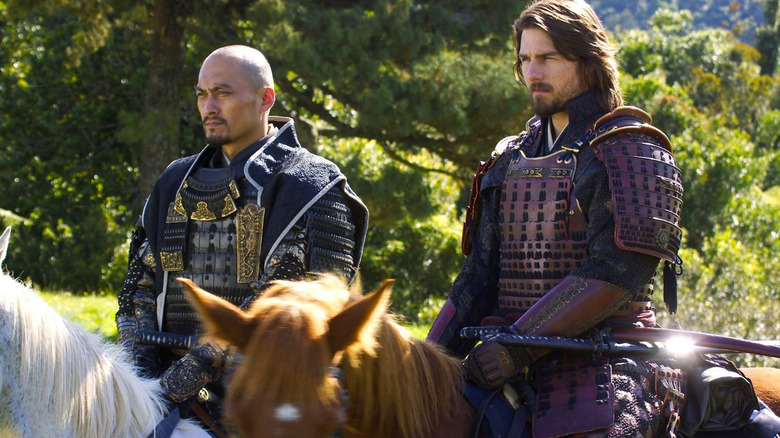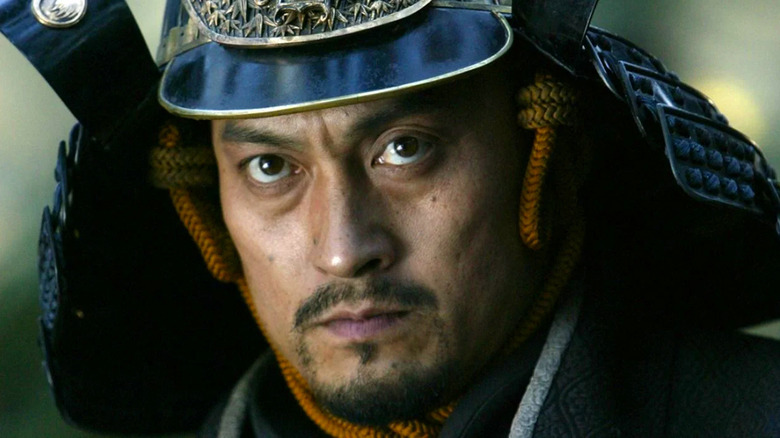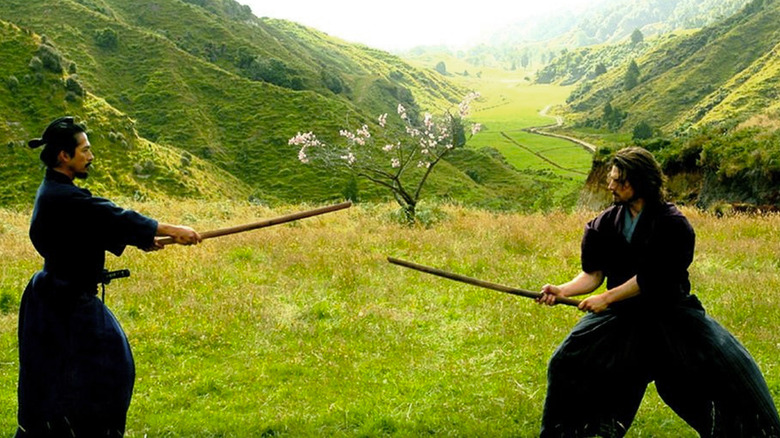Ken Watanabe Believes The Last Samurai Was A Turning Point In Asian Representation In Hollywood
How do you spot a white savior film? In many cases, the trappings are pretty obvious: a white protagonist finds himself in unfamiliar, predominantly non-white territory, immersed in a culture they either hold prejudice towards or know next to nothing about. The protagonist eventually "goes native," fully embracing whatever culture they've come to love (or respectfully appropriated) and singlehandedly saving a marginalized group from whatever injustice they face.
Most white savior films are pretty easy to spot. The status of others, like "The Last Samurai," have been under debate for years. The war epic was helmed by white filmmakers (a key component to the white savior mythos), and stars Tom Cruise as a grizzled American soldier enmeshed in civil unrest in Japan. While the narrative that unfolds is clearly well-intentioned, its misplaced romanticism and historical misconstruction are as difficult to ignore now as they were in 2003.
But is that enough cause to write the film off as a reductive, revisionist fantasy? If you ask Ken Watanabe, the film did more good than harm.
From a certain point of view
Whether it be through Christopher Nolan films like "Inception" and "Batman Begins," or blockbuster fare like "Godzilla: King of the Monsters," you're bound to recognize Ken Watanabe. But it was his work in "The Last Samurai," as the titular samurai in question, that first introduced him to the international stage. It is through his character, Katsumoto, that Cruise's Nathan Algren learns the ways of the samurai, and joins their rebellion against imperial forces. Though their relationship starts off hostile (Katsumoto captures Algren in an effort to "know his enemy"), it eventually blossoms into a mutual respect and intensely-loyal friendship.
If that invokes dynamics in other white savior fare, that's by design: It's a commonly-used trope for films like "The Green Book." But Watanabe doesn't see their relationship — or any aspect of "The Last Samurai" — in that light at all.
"I didn't think of it like that," Watanabe told The Guardian. "I just thought we had the opportunity to depict Japan in a way that we were never able to before. So we thought we were making something special."
It's hard to deny that "The Last Samurai" is a special film, especially for its portrayal of the Japanese. As Watanabe explained, "Before 'The Last Samurai,' there was this stereotype of Asian people with glasses, bucked teeth and a camera." That's because of that time Mickey Rooney donned yellowface in "Breakfast at Tiffany's" The actor continued, "It was stupid, but after ['The Last Samurai'] came out, Hollywood tried to be more authentic when it came to Asian stories."
A different image
White savior film or not, "The Last Samurai" does represent a cultural pivot, both in Hollywood and in Japan. It remains one of the highest grossing films in the latter, winning the Japan Academy Film Prize for Outstanding Foreign Language Film. Watanabe was also nominated for Best Supporting Actor at the Oscars and the Golden Globes, becoming the fourth (and latest) Japanese actor to get the nod in that category. The actor has worked consistently ever since, but he still looks back on "The Last Samurai" with pride. Its prestige helped to usher in a new era for Asian characters in Hollywood, introducing an alternative to the helpless Asian nerd or the ruthless Fu Manchu-type villain.
In some ways, however, Hollywood is still clinging to its archetypes: It could be argued that samurai characters are so popular because they riff on the stoic, battle-hardened martial arts masters that were so beloved in the '90s. It's a character that stuck hard to Watanabe — he's perhaps best known for those roles — and to other Japanese actors like Hiroyuki Sanada (pictured above). But other archetypes, like the Asian male heartthrob, have become more prominent in recent years as well. And, of course, there's Ke Huy Quan's subversive role in "Everything Everywhere All At Once," which allowed the actor to flit between action star, romantic interest, and empathetic hero.
Asian actors are occupying more lead roles now than ever before. Whether "The Last Samurai" is everyone's particular cup of tea, it's still an important milestone for the progress we're seeing now.


